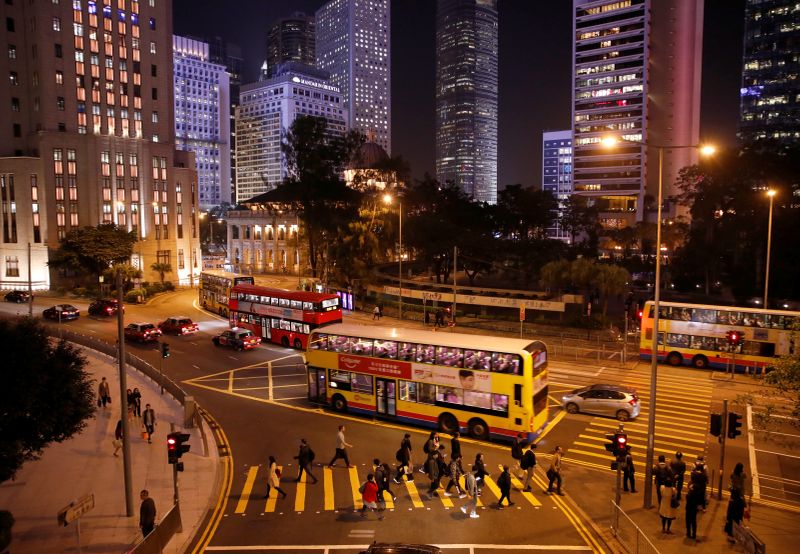By Noah Sin and Sarah Wu
HONG KONG (Reuters) - Hong Kong is expected to announce its largest budget deficit in at least a decade on Wednesday to cushion the shock of often-violent protests and the outbreak of a coronavirus on the recession-hit economy.
Carrie Lam, the Chinese-ruled city's leader, has already proposed measures worth HK$30 billion ($3.85 billion) to help small and medium-sized companies and low-income households cope with the health crisis.
Many companies in tourism and retailing are struggling to survive as a partial closure of the border reduces visitor arrivals to a trickle and keeps residents away from public areas.
Those measures came on top of other handouts totaling HK$35 billion announced in recent months to mitigate the impact of the protests, which saw activists and police clashing in shopping malls and in the financial district.
They were expected to push the 2019/20 budget into a deficit and ensure the gap widened in 2020/21, with more measures due to be announced on Wednesday. Hong Kong usually runs balanced budgets or surpluses, since its pegged currency system commits it to fiscal prudence.
Tommy Wu, senior economist at Oxford Economics, expects the fiscal deficit to be 1.2% of gross domestic product in 2019-20 and 2.6% of GDP in 2020-21.
"To pull the economy out of contraction, you need something that benefits everybody, like cash handouts, tax cuts," Wu said. "Pushing forward infrastructure spending that can be done sooner rather than later would also help."
ANZ analysts expect the government to propose a deficit of 4% of GDP for the coming year.
Final GDP data later on Wednesday is expected to confirm the economy has shrunk for three quarters. Preliminary data showed the economy contracted by 0.4% in October-December from the previous quarter, versus a revised 3.0% contraction in July-September.
On an annual basis, the economy shrank 2.9%, compared with a revised 2.8% fall in the third quarter. For all 2019, the economy contracted by 1.2%, its first annual decline since 2009.
The first quarter of 2020, when Hong Kong recorded its first coronavirus patients, is expected to be significantly worse. Analysts predict the coronavirus will cut 1 or 2 percentage points off first-quarter growth and the contraction for 2020 may be worse than last year's, depending on the government stimulus.
Carlos Casanova, economist for Asia Pacific at Coface, warned handouts are unlikely to boost consumption when residents aren't leaving their homes.
"One-offs and freebies are people pleasers ... they will not offer long-term benefits to growth," said Casanova, who changed his 2019/20 budget deficit forecast to 1.5% of GDP from 0.2% because of the coronavirus.
"We would rather see a continuation of targeted support for affected sectors, as well as better redistributive policies – social housing, healthcare, education – and value-added infrastructure investments," he said.

($1 = 7.7867 Hong Kong dollars)